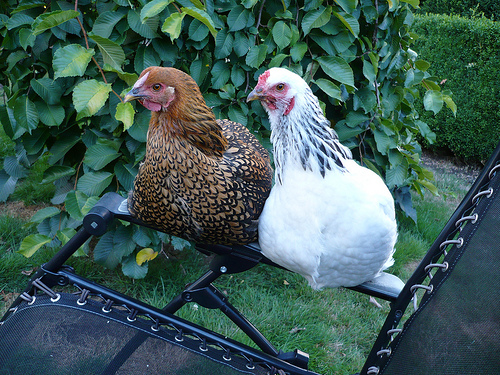This NYT article talks about the trend that is becoming more popular now of keeping chickens in backyards across the nation, such as Chicago, Brooklyn, and the rural West.

From the article, the general sense is that most of the people who recently started raising chickens in their backyards are doing it because of the economic recession. A common sentiment that is repeated in the article is that people want to feel secure, just in case they lose their job or the recession gets worse.
Possibly the most difficult thing about raising animals is feeding them. The problem with raising the chickens in backyards is that you spend nearly as much as you could make just by buying feed for the chickens. There are also the initial costs of providing shelter and purchasing the chicks.
Compared to farms that purchase feed in bulk or have enough land to rotate the chickens on plots of grass, raising your own chickens is inefficient. You are hardly saving any money while increasing the hassle for your household.
In Nature, inputs and outputs balance each other out. For human food production endeavors, inputs and outputs aren’t as well balanced because all the components in a cycle are not always readily available in the same system. People raising animals in cities need to buy inputs from far away and feed that are products of the sun and grown by farmers. Sunlight is free, but farmers are like middlemen in this process because they increase the cost as they pass things along.
Growing your own chicken feed would make the system more ecologically connected, but that means more resources would need to go into another type of production. Hatching your own chicks (which doesn’t seem common by the amount of discussion of chick packaging companies in the article) would also lower the initial costs. You would essentially need a mini-farm in your backyard that contained a relatively closed cycle to make things very efficient.
Overall, I think the reasoning behind these people raising chickens is understandable but somewhat silly. Arguments that homegrown chickens and eggs taste better might be valid, and the sense of security may be worth the effort. But in the end, I don’t think having chickens will be the difference between one family being more successful during a deep recession than another family in the long run because I don’t think it will get to the point where families will have nothing to eat so the chickens would save the family from starvation.
Image credit:
Flickr user james+3